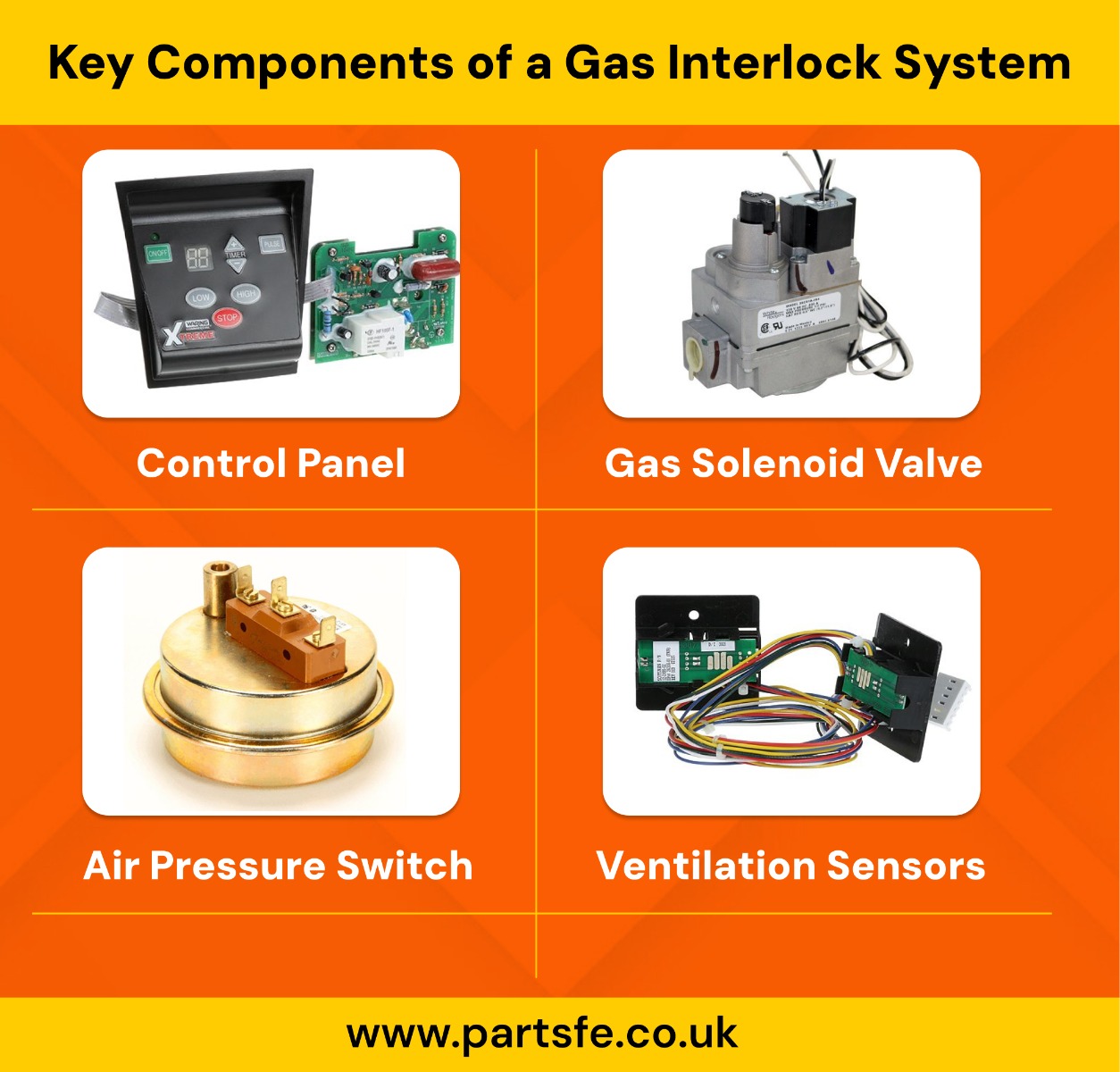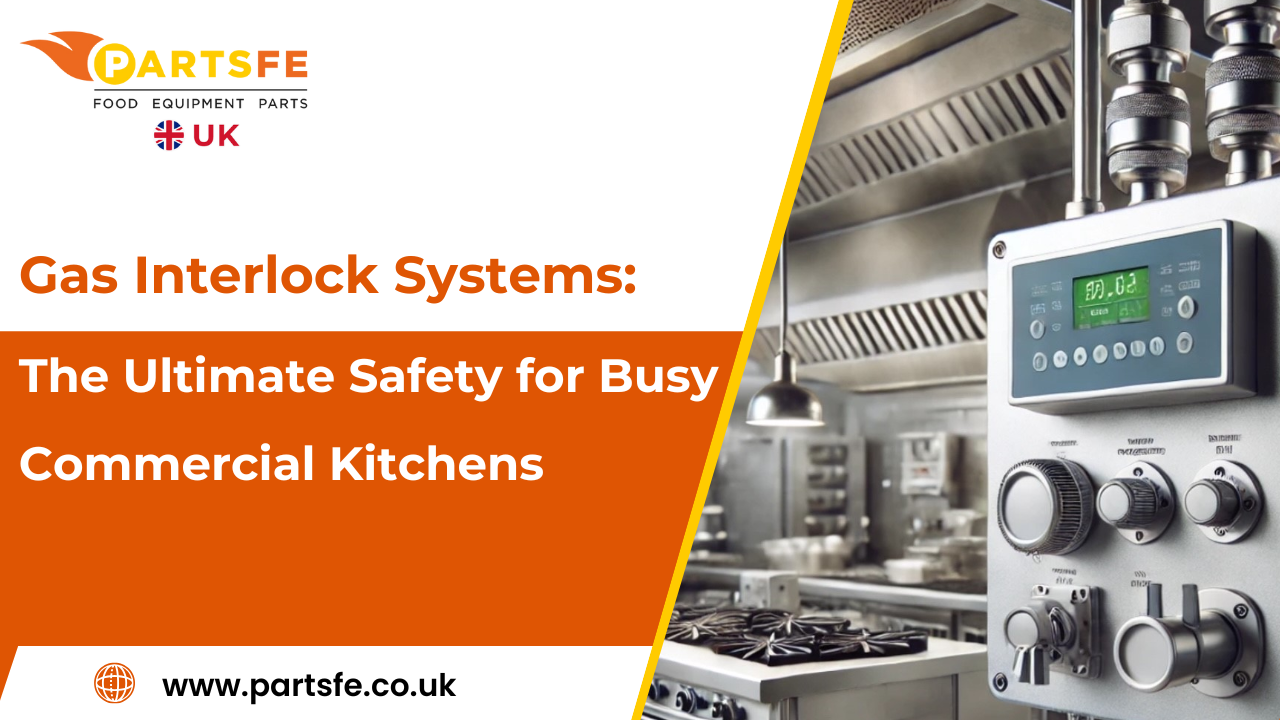Gas Interlock Systems The Ultimate Safety for Busy Commercial Kitchens
Commercial kitchens are a busy place and need top functionality and safety. Under pressure, chefs, kitchen staff and management deliver high quality meals efficiently. This safety cannot be put aside in the background in the clatter of pots and pans, the sizzle of stuff on the grill, and the hum of kitchen machines. With the presence of gas appliances such as stoves, ovens, and fryers, it is even more important to take safety measures. It is at these demanding environments that gas interlock systems can be seen as crucial safety elements that protect personnel and assets.
What is a Gas Interlock System?
A Gas Interlock System is a device that prevents the ignition of a gas appliance by ensuring that gas and electricity are not simultaneously present.
A gas interlock system is a type of safety mechanism that is used to control the supply of gas to commercial kitchen appliances in a safe manner. It is a simple term for a monitoring and control system that stops gas from being released in the event that some conditions are not met to prevent a gas leak and possibly a dangerous situation.
Basic functionality:
The basic function of a gas interlock system is to guarantee that gas appliances are not in use when there is insufficient ventilation. This is important to keep the air quality and to avoid the accumulation of dangerous gases like carbon monoxide.
Key Components of a Gas Interlock System
A gas interlock system is made up of several key components:
-
Control panel: This controls the operation of the gas solenoid valves and monitors the inputs from the various sensors in the kitchen.
-
Gas solenoid valve: The gas solenoid valve controls the gas supply to appliances. When the conditions require safety, it can automatically shut off the gas.
-
Air pressure switch: It is used to monitor the airflow of the ventilation system. If proper ventilation is not detected, it sends a signal to the control panel to close the solenoid valve and shut off the gas supply.
-
Ventilation sensors: Continuously monitor air quality, that is, it monitors the oxygen levels, to ensure that the oxygen present is safe, and that the concentration of bad things like carbon monoxide, radon, even the humidity is at low levels.

Why are Gas Interlock Systems Essential in Commercial Kitchens?
Implementing gas interlock systems in commercial kitchens is not merely a good practice; it is essential for several reasons.
1. Prevention of gas leaks and associated hazards
Catastrophic results can happen from a gas leak, and include explosions or fires, or toxic gas exposure. However, with correctly working gas interlock systems, these possibilities are greatly reduced because gas is only supplied to appliances when the environment is safe. In a busy kitchen, mistakes can happen quickly, so having an automatic safety mechanism that prevents gas releases protects valuable assets and lives in a chaotic environment.
2. Maintenance of proper ventilation
Effective ventilation is important in health and safety in commercial kitchens. Gas interlock systems ensure only that gas appliances are turned on when the kitchen’s ventilation is sufficient.
-
The poor air quality can irritate the kitchen staff, causing them to get headaches, feel fatigued or have more serious health problems over time. Gas interlock systems are designed to keep the air fresh and safe for workers in the kitchen.
3. Compliance with safety regulations and standards
Gas appliances are strictly regulated in most countries for installation and operation.
-
These standards are enforced by commercial kitchens with gas interlock systems to avoid fines and legal complications.
-
A restaurant’s commitment to safety and compliance, ensuring that the restaurant is complying with best practices, may actually bolster a restaurant’s reputation.
4. Regulatory requirements and standards
It is a fact that a commercial kitchen has to obey several regulations and safety standards depending on the region or country.
-
For example, in the UK, BS6173 provides the requirements for the provision of safe gas appliances in commercial premises.
5. Legal obligations for commercial kitchen operators
Owners of commercial kitchens are legally obligated to follow the local authorities' safety regulations. This also implies that gas appliances should be fitted with safety devices like gas interlock systems to reduce the risk. If these regulations are not followed, it can lead to serious penalties, closure of the establishment, and damage to reputation.
How Do Gas Interlock Systems Work?
Commercial kitchen gas interlock systems work by a series of actions that constantly check environmental conditions of a commercial kitchen.
-
Monitoring of ventilation systems: The kitchen is constantly checked by the air pressure switch for airflow. If the ventilation system fails (is blocked or is not enough), the switch detects a decrease in airflow and automatically responds.
-
Automatic shutdown of gas supply: If the ventilation issues are detected, the air pressure switch sends a signal to the control panel, which in turn activates the solenoid valve and stops the gas supply. This automated response is important in avoiding unnatural gas buildup and keeping the working environment safe.
-
Integration with other safety devices: Gas interlock systems can be improved by adding them to other safety systems, like carbon monoxide detectors. The system can also trigger the same automatic shutdown if elevated levels of this toxic gas are detected, so safety is never compromised.
Benefits of Implementing Gas Interlock Systems
|
Benefits |
Description |
|
Enhanced safety for staff and customers |
Gas interlock systems ensure gas is supplied only under safe conditions, reducing the risk of accidents, poisoning, or fires. |
|
Prevention of operational disruptions |
Minimizes the chances of incidents that could disrupt operations, preventing financial losses and reputational damage. |
|
Potential insurance benefits and reduced liability |
Insurance companies favor kitchens with safety measures, leading to lower premiums and reduced liability in case of claims. |
Installation and Maintenance Considerations
Some installation and maintenance considerations should be taken into account when implementing a gas interlock system:
-
Professional installation requirements: Gas interlock systems are an essential installation that must be carried out by certified professionals with gas safety protocol experience. Proper installation of the system guarantees that the system works properly and meets all the regulations and standards.
-
Regular maintenance and testing protocols: Prevention requires inspection, maintenance, and testing, like any safety system. All components like sensors and valves should be checked to ensure they are functioning optimally, and this should be done during scheduled inspections. To ensure a safe kitchen environment, faulty components should be replaced immediately.
-
Emergency procedures training of staff: Gas interlock system training should be given to all kitchen staff, and they should know how to respond in case of an emergency. It is essential to maintain a culture of safety in the kitchen and understanding the purpose and functionality of the system helps staff operate safely.
How to Set Up a Functional Commercial Kitchen: Key Appliances
An important part of maintaining safety in busy commercial kitchens is gas interlock systems. Gas appliances are essential in protecting us from the risks that come with gas appliances such as leaks and poor air quality. Following regulatory requirements, frequent maintenance and fostering a safe culture should lead to a safer working environment for staff and guests.
Not only are proactive safety measures like the use of gas interlock systems good for the aforementioned purposes, they are also a necessity for the safe operation of any commercial kitchen. PartsFe UK offers a wide range of commercial catering equipment spare parts from top brands. Whether it's an evaporator coil for an ice machine, a heating element for an oven, or a replacement grate for a grill, find the right parts for efficient operation.
FAQs
What is the main function of a gas interlock system in a commercial kitchen?
Gas interlock system will automatically shut off gas supply to kitchen appliances if the ventilation system fails to prevent accumulation of harmful gases and fire risks.
Are ga interlock systems legally required in commercial kitchens?
It is indeed a requirement for commercial kitchens to install gas interlock systems in order to meet safety standards and compliance (for the safety of staff and customers alike).















